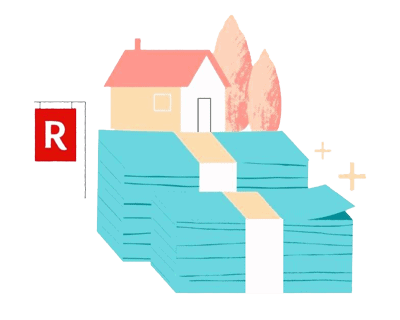When it comes to purchasing a home, buyers may find it difficult to find financing beyond the conforming loan limit. If this is the case, you may need a jumbo loan. Whether your sights are set on a new home in Austin or a sprawling estate in Dallas, join us as we delve into the intricacies of jumbo loans in Texas in 2024.

What is a jumbo loan?
A jumbo loan is a type of mortgage that’s designed to help you finance the purchase of a home that exceeds the conforming loan limits set by the Federal Housing Finance Agency. In Texas, this type of loan is often needed for high-end homes or properties located in expensive housing markets like Dallas. With a jumbo loan, you can get the financing you need to buy your dream home, even if it’s more expensive than what a traditional mortgage can finance.
If the loan amount needed to buy the home is more than the conforming loan limit, you’ll need a jumbo loan. But because of the larger loan amounts and increased risk for lenders, Texas jumbo loans often come with higher interest rates and stricter requirements than conventional loans. For instance, a larger down payment and a higher credit score may be required to qualify for a jumbo loan.
What is the jumbo loan limit in Texas?
In Texas, the conforming loan limit is $766,550 across all counties. So, for example, if you’re buying a home in Harris County, where the median sale price is $312,000, a loan limit exceeding $766,550 would be considered a jumbo loan.
As a reminder, the loan amount is what determines whether or not you’ll need a jumbo loan, not the price of the home. So, if you were to put $100,000 down on a $780,000 home in Cypress, the loan would be $680,000, which is under the conforming loan limit for this area. In this case, you would not need a jumbo loan.
For more information on the conforming loan limit in your county, refer to the FHFA map.
What are the requirements for a jumbo loan in Texas?
To qualify for a jumbo loan in Texas, borrowers must meet stricter requirements than they would for a conforming loan. Each lender may have different requirements or processes, but below are the typical requirements for borrowers seeking a jumbo loan.
Higher credit score: In order to be eligible for a jumbo loan in Texas, lenders generally expect homebuyers to have a credit score of at least 720. While some lenders may consider a score as low as 660, a credit score of less than that is typically not accepted.
Larger down payment: Jumbo loans usually require larger down payments than conventional mortgages. Generally, lenders require a down payment of at least 20% of the home’s purchase price to qualify for a jumbo loan. However, some lenders may require a higher percentage, depending on the borrower’s creditworthiness and overall financial situation. Don’t forget that larger down payments can help to reduce monthly mortgage payments, as well as overall interest costs over the life of the loan.
More assets: To qualify for a jumbo loan, lenders require borrowers to demonstrate that they have sufficient liquid assets or savings to cover at least one year of loan payments. The exact amount of assets needed can vary depending on the lender and the size of the loan, but having more assets can increase the chances of approval and potentially lead to better terms and interest rates.
Lower debt-to-income ratio (DTI): When applying for a non-conforming loan, Texas lenders typically look for a borrower with a debt-to-income ratio (DTI) below 43%. Ideally, a DTI closer to 36% or lower is preferred. The DTI is calculated by dividing the sum of all monthly debt payments by gross monthly income. A lower DTI signifies a borrower’s ability to manage their current debt load while taking on additional mortgage payments. It also indicates greater financial stability and the ability to make on-time payments towards their jumbo loan.
Additional home appraisals: A home appraisal is required whenever a homebuyer receives financing for their home purchase. However, for jumbo loans, your lender may require an additional appraisal.

























